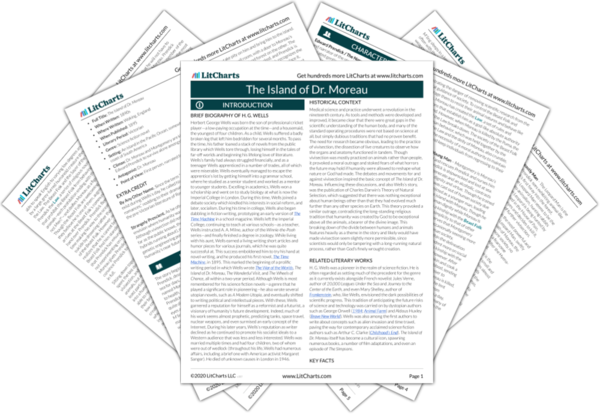The Law represents religious authority and its critical role in maintaining order in human society (in Wells’s view). Moreau’s Law maintains order on the island by requiring the Beast Folk to resist their animalistic urges, replacing them with human qualities. When the Law’s moral authority is challenged and ultimately breaks down, the Beast Folk resort to their animal instincts and the order of society falls apart. This argues that, similarly, if the religious or moral authority of a human society is lost, human beings will cease repressing their most basic desires and the structure of civilization will break down.
Structurally, the Law works very similarly to Christianity. Moreau establishes himself as the ultimate authority, the creator of all things, occupying the same role as God. The Law’s dictates teach the Beast Folk how to repress their basic urges and act with civility, sounding very similar to the biblical Ten Commandments in their recitation. The House of Pain serves as the threat of punishment, negatively enforcing obedience to the Law, much like the Christian idea of hell. With this similarity, the breakdown of Moreau’s Law makes a distinctive point in the way that religion may lose its moral authority within human society. When Moreau—being both the embodiment of the Law and its source of authority—is killed, it effectively represents the death of moral authority. The Beast Folk instantly begin to doubt the Law and the most rebellious among them throw it off entirely, becoming animals once more. Though some of the Beast Folk want to maintain the Law even though they no longer believe in Moreau’s authority, they are ultimately unable to maintain this; without the ideal to strive toward and the threat of punishment, everyone gives in to their repressed urges. Thus, in human society, if the authority that ties together a religious or moral system—in Christianity’s case, the existence of God—is removed, the entire system may persist for a time but will ultimately crumble. Unless that moral system can be quickly replaced, the ordering of society will fall apart as human beings fall prey to their most basic, antisocial urges. This suggests that without a religious or moral system governing individuals, it may be impossible for human society to be anything more than a group of feral animals.
The Law Quotes in The Island of Dr. Moreau
I would not draw lots, however, and in the night the sailor whispered to Helmar again and again, and I sat in the bows with my clasp-knife in my hand—though I doubt I had the stuff in me to fight. And in the morning I agreed to Helmar’s proposal, and we handed halfpence to find to the odd man.
A horrible fancy came into my head that Moreau, after animalizing these men, had infected their dwarfed brains with a kind of deification of himself.
“For every one the want that is bad,” said the grey Sayer of the Law. “What you will want, we do not know. We shall know. Some want to follow things that move, to watch and slink and wait and spring, to kill and bite, deep and rich, sucking the blood…It is bad. ‘Not to chase other Men; that is the Law. Are we not Men?’”
“Who breaks the Law—” said Moreau, taking his eyes off his victim and turning towards us. It seemed to me there was a touch of exultation in his voice.
“—goes back to the House of Pain,” they all clamored; “goes back to the House of Pain, O Master!”
A strange persuasion came upon me that, save for the grossness of the line, the grotesqueness of the forms, I had here before me the whole balance of human life in miniature, the whole interplay of instinct, reason, and fate, in its simplest form.
[Montgomery] cracked his whip in some trepidation, and forthwith [the Beast Folk] rushed at him. Never before had a Beast Man dared to do that.
“Children of the Law,” I said, “He is not dead…he has changed his shape—he has changed his body,” I went on. “For a time you will not see him. He is…there”—I pointed upward— “where he can watch you. You cannot see him. But he can see you. Fear the Law.”
I was perhaps a dozen seconds collecting myself. Then I cried, “Salute! Bow down!”
[The Hyena-Swine’s] teeth flashed upon me in a snarl. “Who are you, that I should…”
Perhaps a little too spasmodically, I drew my revolver, aimed, and quickly fired…[and] knew I had missed.
“’We have no Master, no Whips, no House of Pain any more. There is an end. We love the Law, and will keep it; but there is no pain, no Master, no Whips forever again.’ So they say.”












